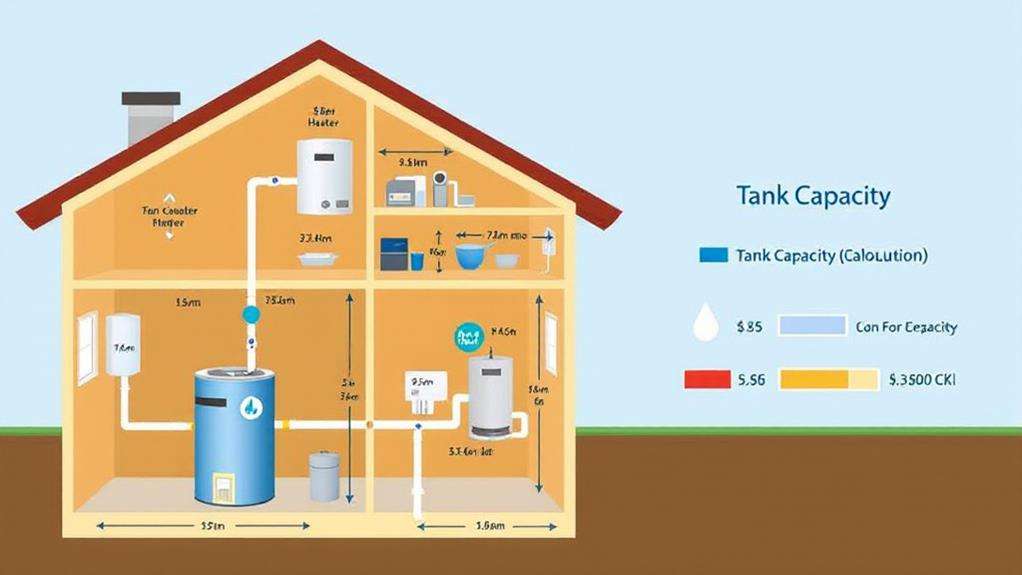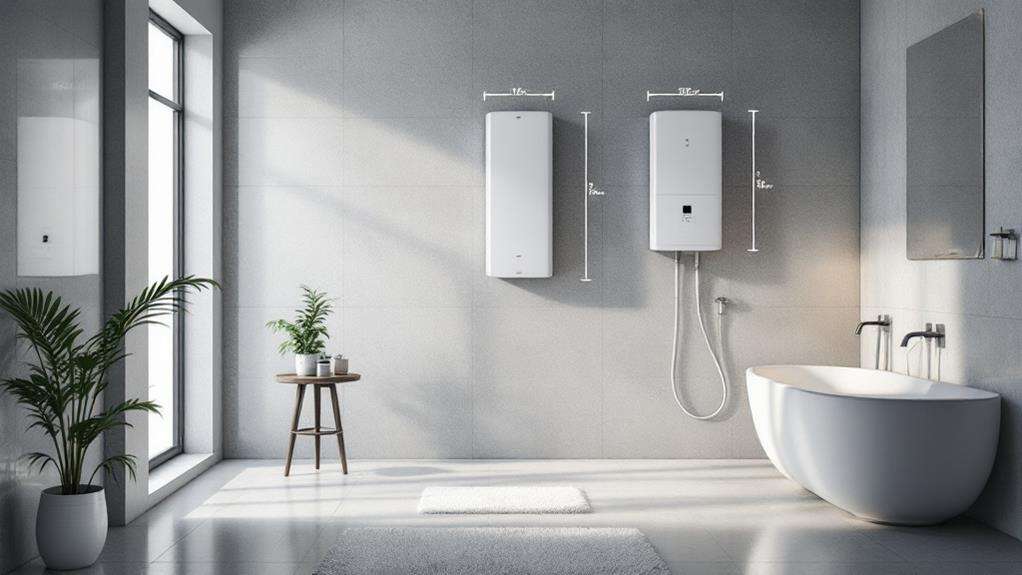How to Choose the Right Size Water Heater for Your Home
Choosing the right size water heater begins by evaluating your household's hot water needs. Consider your family size, daily routines, and water usage patterns. For 1-2 bedroom homes, a 40-50 gallon tank is often suitable, while 3-4 bedroom homes may require a 50-80 gallon unit. Pay attention to the water heater's energy efficiency, as indicated by the Energy Factor (EF) rating. Tankless models offer compact size and energy savings, but ensure the flow rate meets your demands. Proper installation and maintenance are also crucial for optimal performance and safety. To learn more about selecting the ideal water heater for your home, continue reading.
Key Takeaways
- Evaluate your household's hot water needs based on family size, daily usage patterns, and potential future changes.
- Determine the appropriate tank capacity, typically 40-50 gallons for 1-2 bedrooms and 50-80 gallons for 3-4 bedrooms.
- Consider energy efficiency by looking for high Energy Factor (EF) ratings, good insulation, and proper venting.
- Decide between a traditional tank-style or a more compact and efficient tankless water heater based on your needs and available space.
- Ensure proper installation and maintenance by a licensed professional to prevent safety issues and maximize performance.
Factors to Consider
When choosing a water heater, several key factors deserve your consideration. First and foremost, energy efficiency is crucial. Look for models with high Energy Factor (EF) ratings, as these will save you money on your utility bills in the long run. Additionally, think about the fuel type that works best for your home - electricity, natural gas, or propane. Each option has its own advantages and disadvantages in terms of cost, availability, and environmental impact.
Next, evaluate the size of the unit based on your household's hot water needs. Larger families will require a higher-capacity heater to meet their demands. Properly sizing the water heater will ensure you have enough hot water without wasting energy heating more than you need. Don't forget to factor in the available space in your home, as water heaters come in various dimensions that may or may not fit your designated installation area.
Determining Household Needs
Determining the hot water needs of your household is crucial when choosing the right water heater. Evaluate your family size and water usage patterns to ensure you select a unit that can meet your demands. Consider the number of people living in your home, as larger families typically require a higher-capacity water heater. Additionally, think about your daily routines and how much hot water you use for tasks like showering, laundry, and dishwashing. High-demand households may need a tankless or hybrid water heater, while smaller households may do well with a traditional tank-style model. Don't forget to factor in any future changes, such as an expanding family or renovations that could impact your hot water needs. By carefully assessing your household's requirements, you can choose a water heater that provides sufficient hot water without wasting energy or space.
Calculating Tank Capacity

To calculate the appropriate tank capacity for your water heater, consider the number of household members and their hot water usage. A larger household with more people will require a larger tank capacity to meet the increased demand.
When determining tank size, consider these factors:
- Number of bedrooms: As a general rule, a 40-50 gallon tank is suitable for a 1-2 bedroom home, while a 50-80 gallon tank is better for 3-4 bedrooms.
- Efficiency: Look for a water heater with a high energy factor (EF) rating, which indicates the heating element's efficiency. Higher EF means lower energy costs.
- Tank insulation: Opt for a model with good tank insulation to minimize heat loss and improve energy efficiency.
Tankless Water Heater Considerations
Tankless water heaters offer an energy-efficient alternative to traditional tank-style units. These on-demand systems heat water as it's needed, rather than maintaining a constant supply, which can save you a significant amount on your energy bills. When considering a tankless water heater, pay close attention to the efficiency ratings. Look for models with an Energy Factor (EF) of 0.82 or higher, as these will be the most energy-efficient options.
Another important factor to consider is the space requirements. Tankless heaters are much smaller than traditional tank units, making them a great choice if you're limited on space. However, you'll need to ensure there's adequate ventilation and clearance around the unit for proper operation. Be mindful of the water flow rate as well, as tankless heaters may not be able to keep up with high-demand scenarios like multiple showers running simultaneously. With the right size and efficiency rating, a tankless water heater can be a smart investment for your home.
Selecting the Appropriate Size

When selecting a tankless water heater, the appropriate size is crucial for ensuring optimal performance and energy efficiency. You'll want to consider your household's hot water demands, taking into account the number of bathrooms, appliances, and the overall size of your home. Selecting the right size tankless unit can make a significant difference in your energy costs and comfort.
To determine the appropriate size, consider these key factors:
- Flow rate: Measure the flow rate of your highest-demand appliance or fixture, such as a shower, and choose a tankless unit that can handle that flow rate.
- Fuel type: Decide whether you'll use natural gas, propane, or electricity to power your tankless water heater, as this will affect the sizing requirements.
- Energy efficiency: Look for tankless models with high energy factor (EF) ratings, as they'll provide the most efficient hot water heating.
Installation and Maintenance
Proper installation and regular maintenance are critical for ensuring your tankless water heater operates safely and efficiently. The venting requirements for your tankless water heater must be carefully followed to ensure proper airflow and prevent carbon monoxide buildup. Improper venting can compromise the energy efficiency of your unit and pose serious health risks.
To maximize energy efficiency, your tankless water heater should be installed by a licensed professional who can ensure the proper gas and water line connections. Regular maintenance, such as flushing the unit to remove mineral buildup, is also essential for maintaining peak performance and energy savings over the long term. Be sure to follow the manufacturer's recommended maintenance schedule, which may include inspecting the venting system and checking for any leaks or other issues.
